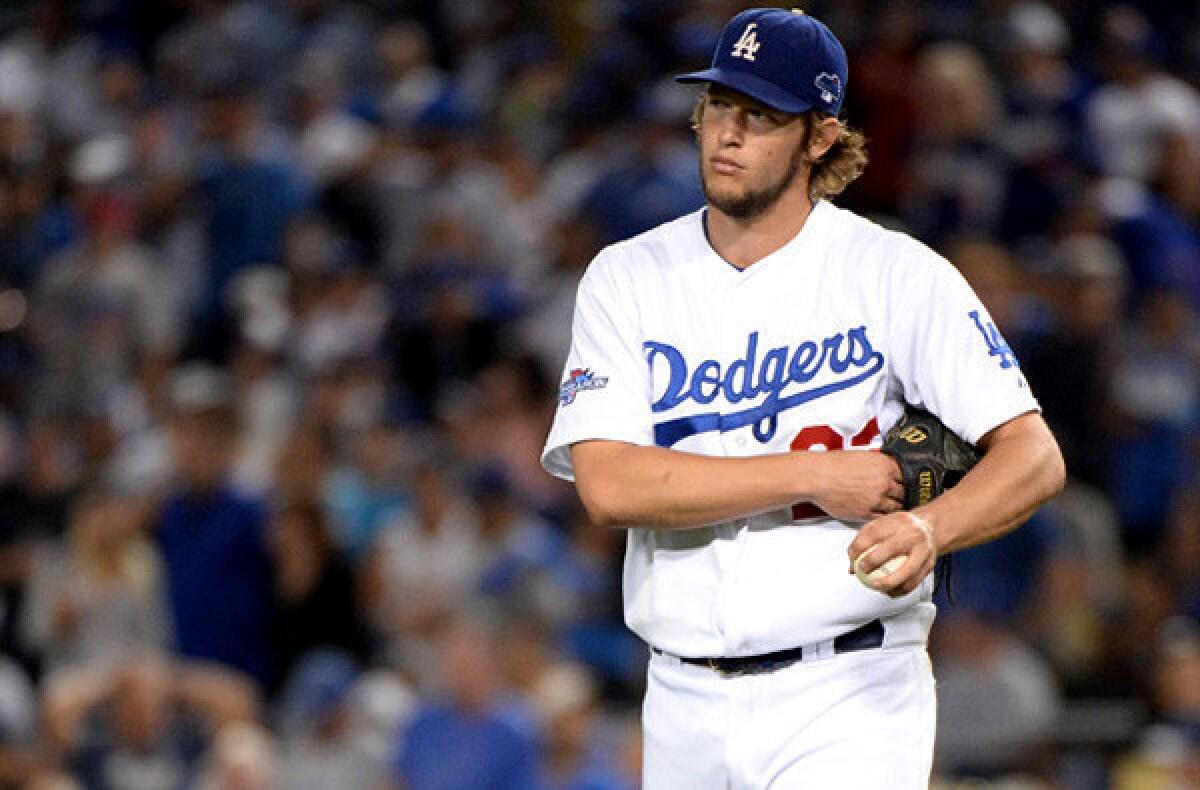Risk-aware Dodgers comfortable with Clayton Kershaw

- Share via
Signing a pitcher to a long-term contract is risky, even if that pitcher is Clayton Kershaw.
Dodgers President Stan Kasten acknowledged that reality Friday, when his team formally announced its seven-year, $215-million deal with Kershaw.
“We know all the precedents, we know all the risks,” Kasten said.
Nonetheless, the franchise that previously signed Kevin Brown and Darren Dreifort to regrettable deals made the 25-year-old Kershaw the highest-paid pitcher in the history of baseball.
“He checks all the boxes — on the field, off the field, in the community, age-wise,” Kasten said. “There’s been a lot of attention to this being the biggest contract for a pitcher in baseball. That is the case, and if someone should have that contract it should be the best pitcher in baseball and that is what we regard Clayton as.”
The Dodgers had to offer Kershaw this type of deal to prevent him from testing the free-agent market after this season. A healthy market for top-line pitchers was established last winter, when Justin Verlander of the Detroit Tigers and Felix Hernandez of the Seattle Mariners signed seven-year contracts. Verlander received $180 million and Hernandez $175 million.
“It’s tough to have, in our mind, the best pitcher in baseball, then tell him we’re not going to do what others have done for others,” General Manager Ned Colletti said.
In fact, the Dodgers and Kershaw discussed the possibility of an even longer contract. Speaking on a conference call from his home in the Dallas area, Kershaw said he wasn’t interested.
“For me personally, this is the longest amount I was comfortable with committing myself towards,” Kershaw said. “I always want to be able to see the finish line. I think anything longer than this, I would feel overwhelmed to try and live up to those expectations.”
The Dodgers minimized their risk by securing an insurance policy on the contract in case Kershaw is injured. They have a similar policy on the six-year, $147-million deal to which they signed Zack Greinke last year.
They further hedged their investment by refusing to include a no-trade clause. In return, they made some concessions. If Kershaw is traded, he can void the remainder of the contract in the following off-season. He can also opt out of the deal after five seasons, which would give him the opportunity to enter the free-agent market and sign perhaps an even more lucrative contract at age 30.
The Dodgers opened talks with Kershaw in March, according to Kasten. In the middle of last season, the two sides were close to a deal but couldn’t agree on the final details. At that point, they agreed to resume discussions this winter.
Kershaw acknowledged he took a gamble by not finalizing the deal during the season.
“Every time you go out there and pitch, there’s a risk,” he said. “But that really never crosses my mind. If I’d gotten hurt last year, I wouldn’t have any regrets with how everything went down. Ultimately, I felt pretty confident either way.”
Kershaw understands his contract will result in heightened expectations.
“As there should be, if your salary’s out there and you’re one of the highest-paid players in the game,” he said. “You’re going to be expected to be one of the best players in the game. That’s fine with me.”
The annual average value of Kershaw’s deal is $30.7 million, the highest ever for any player at any position. Asked whether that was important to him, he replied, “I didn’t really think about it in terms of myself. I think you always think about the next guy. That’s why our union is so good. We always try and set a precedent for the next guy.”
Kershaw said he would direct some of his future earnings toward his charitable endeavors, which include an orphanage he and his wife Ellen built in Zambia.
“I think Ellen and I understand the effects we can have on a lot of people with this money, and we just realize to whom much is given, much is expected,” he said.
Twitter: @dylanohernandez
More to Read
Go beyond the scoreboard
Get the latest on L.A.'s teams in the daily Sports Report newsletter.
You may occasionally receive promotional content from the Los Angeles Times.










